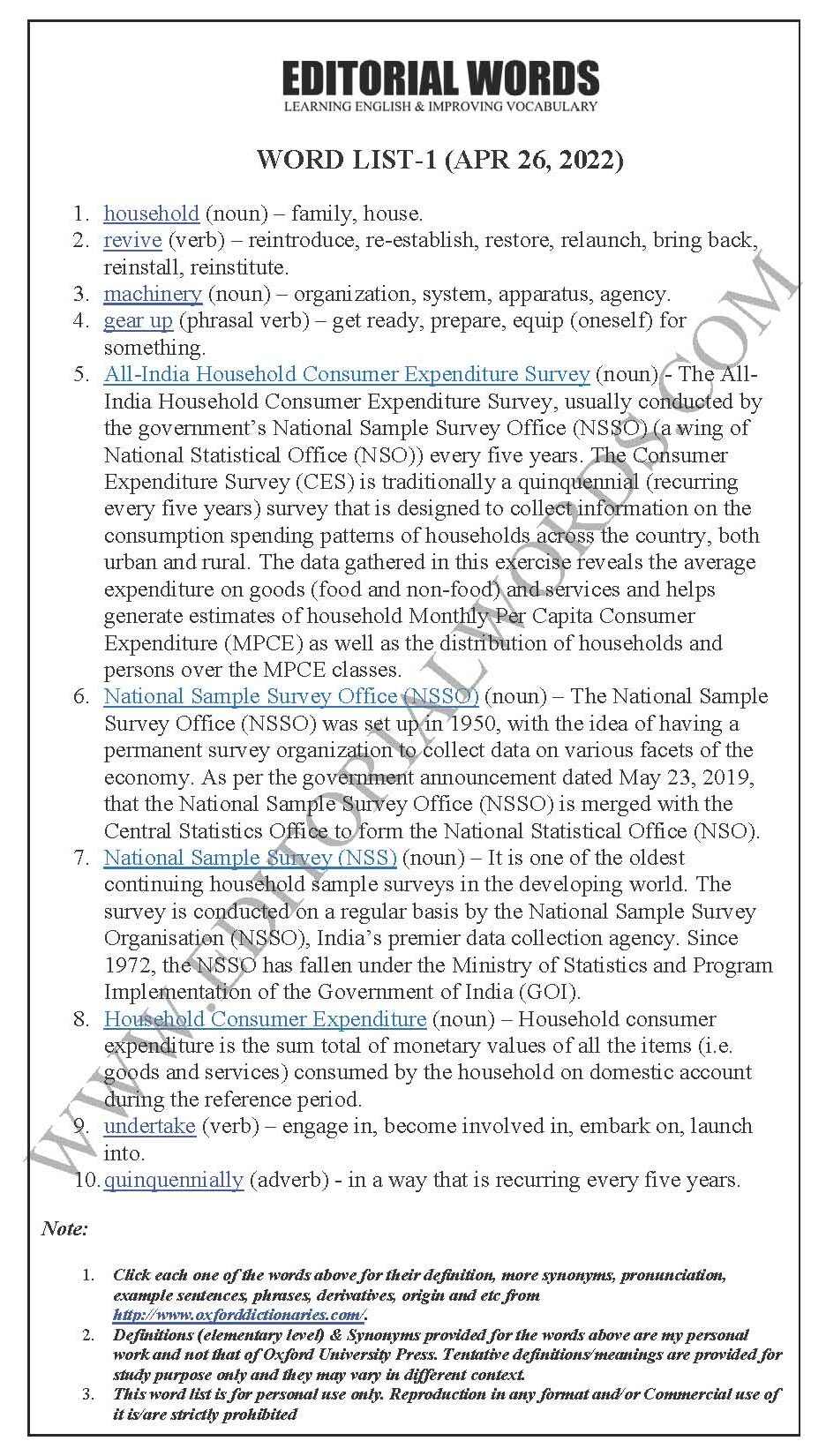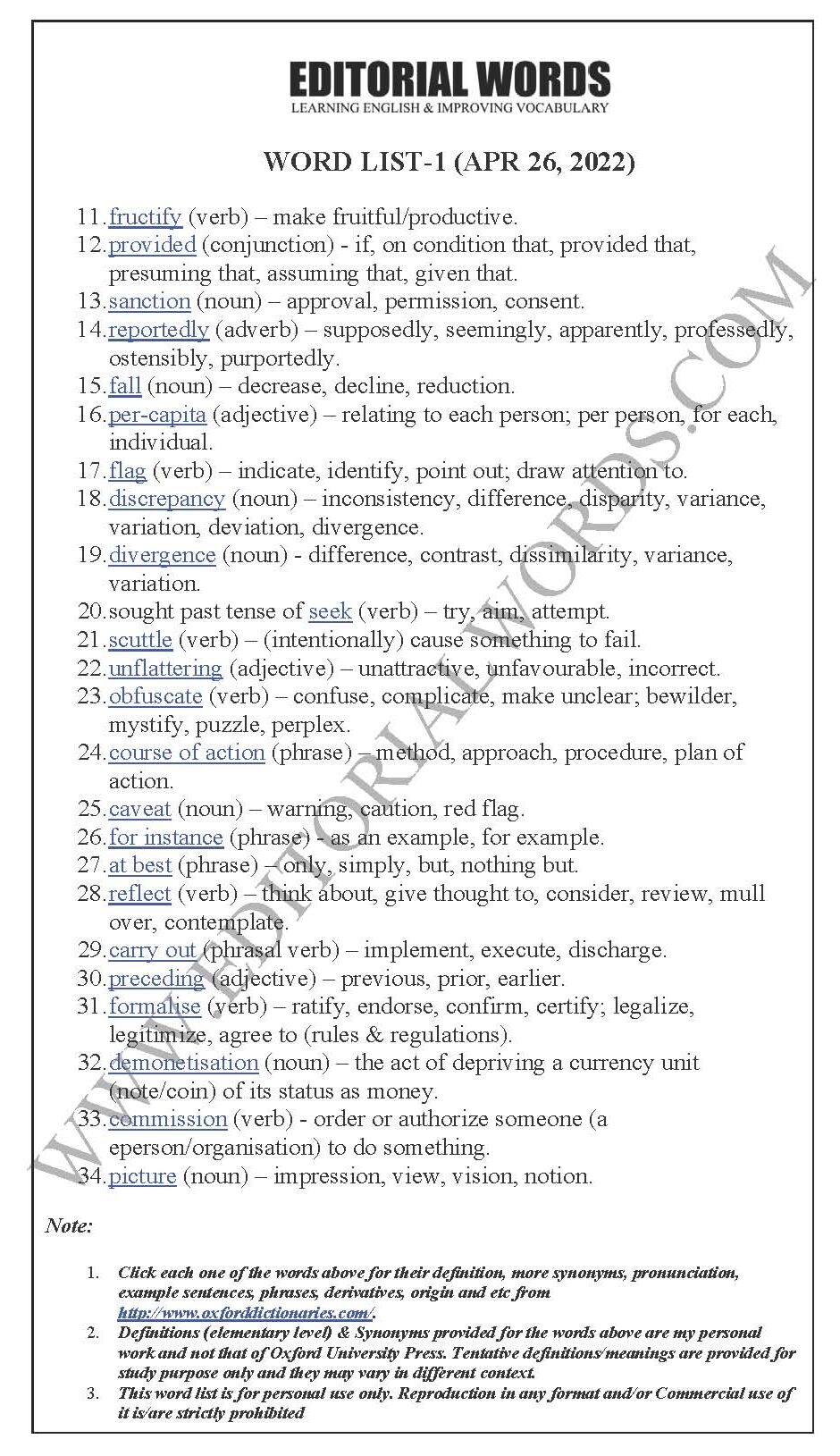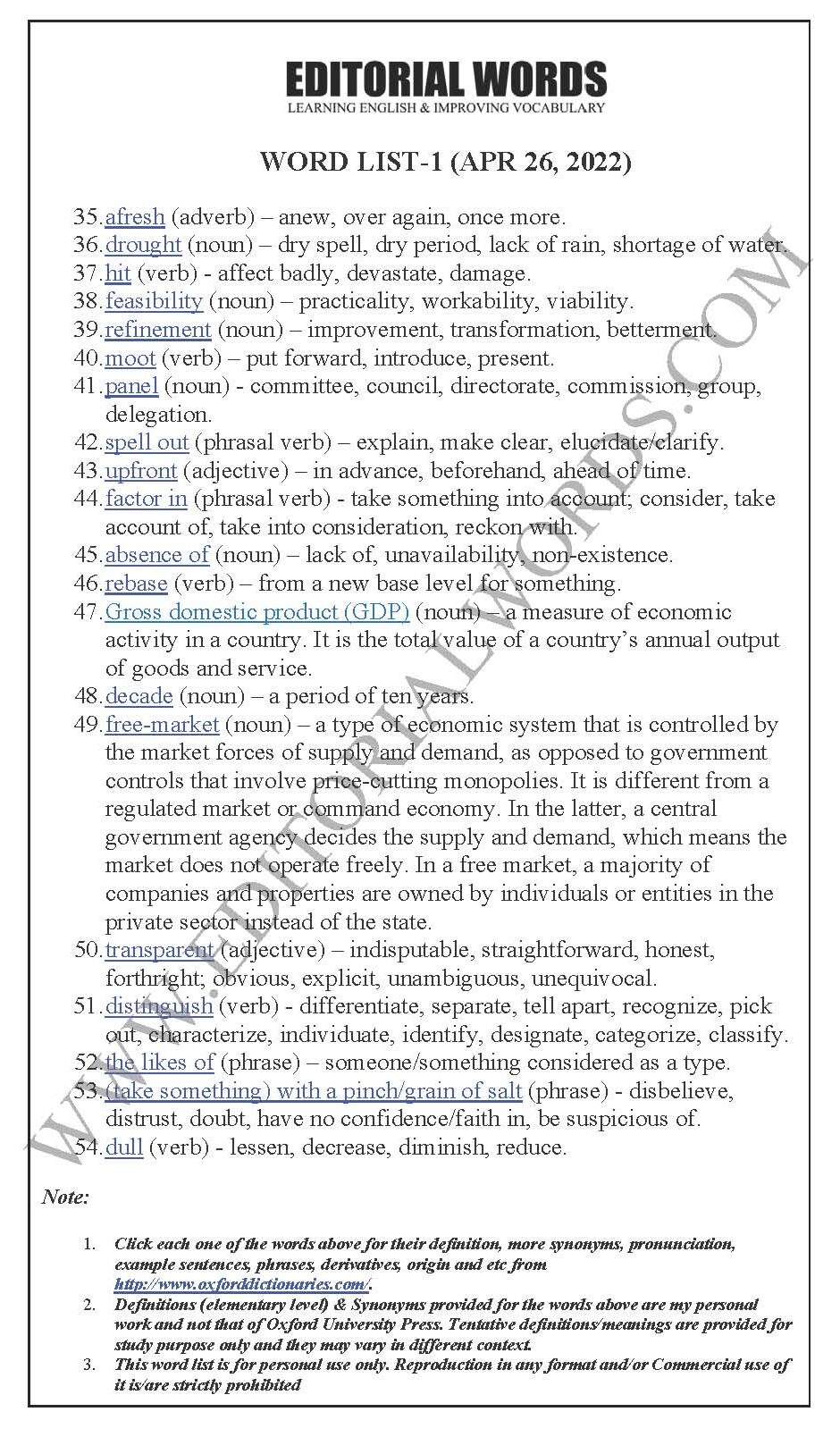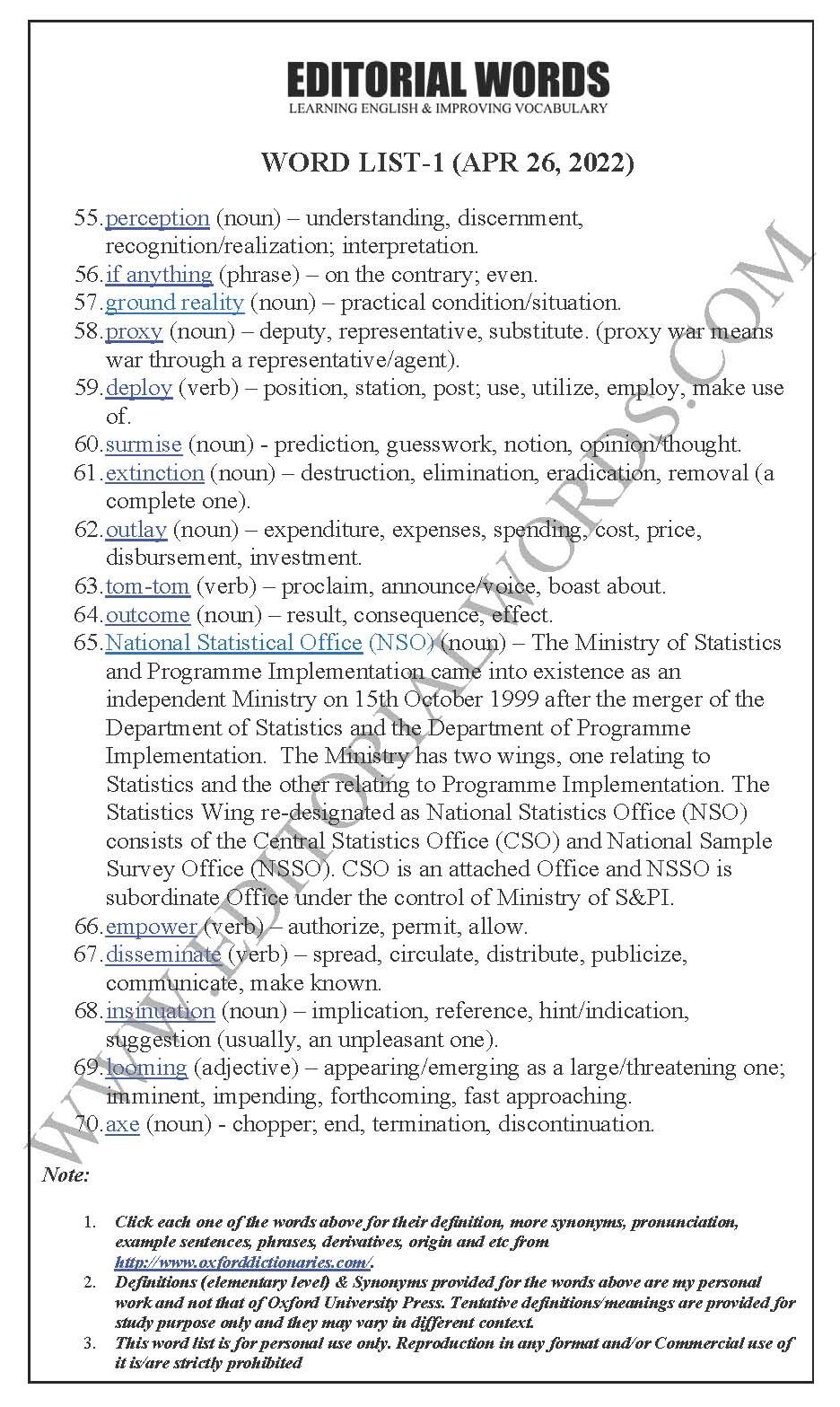The Hindu Editorial (Data, interrupted) – Apr 26, 2022
India’s official statistical machinery is gearing up to relaunch the All-India Household Consumer Expenditure Survey, traditionally undertaken quinquennially, from July 2022. For further reading, visit “The Hindu”. Below is today’s word list-1 for The Hindu Editorial (Data, interrupted) – Apr 26, 2022.
To read this article, click “The Hindu”.
This preview is provided here with permission.
Courtesy: The Hindu
The Hindu Editorial (Data, interrupted) – Apr 26, 2022:
- household (noun) – family, house.
- revive (verb) – reintroduce, re-establish, restore, relaunch, bring back, reinstall, reinstitute.
- machinery (noun) – organization, system, apparatus, agency.
- gear up (phrasal verb) – get ready, prepare, equip (oneself) for something.
- All-India Household Consumer Expenditure Survey (noun) – The All-India Household Consumer Expenditure Survey, usually conducted by the government’s National Sample Survey Office (NSSO) (a wing of National Statistical Office (NSO)) every five years. The Consumer Expenditure Survey (CES) is traditionally a quinquennial (recurring every five years) survey that is designed to collect information on the consumption spending patterns of households across the country, both urban and rural. The data gathered in this exercise reveals the average expenditure on goods (food and non-food) and services and helps generate estimates of household Monthly Per Capita Consumer Expenditure (MPCE) as well as the distribution of households and persons over the MPCE classes.
- National Sample Survey Office (NSSO) (noun) – The National Sample Survey Office (NSSO) was set up in 1950, with the idea of having a permanent survey organization to collect data on various facets of the economy. As per the government announcement dated May 23, 2019, that the National Sample Survey Office (NSSO) is merged with the Central Statistics Office to form the National Statistical Office (NSO).
- National Sample Survey (NSS) (noun) – It is one of the oldest continuing household sample surveys in the developing world. The survey is conducted on a regular basis by the National Sample Survey Organisation (NSSO), India’s premier data collection agency. Since 1972, the NSSO has fallen under the Ministry of Statistics and Program Implementation of the Government of India (GOI).
- Household Consumer Expenditure (noun) – Household consumer expenditure is the sum total of monetary values of all the items (i.e. goods and services) consumed by the household on domestic account during the reference period.
- undertake (verb) – engage in, become involved in, embark on, launch into.
- quinquennially (adverb) – in a way that is recurring every five years.
- fructify (verb) – make fruitful/productive.
- provided (conjunction) – if, on condition that, provided that, presuming that, assuming that, given that.
- sanction (noun) – approval, permission, consent.
- reportedly (adverb) – supposedly, seemingly, apparently, professedly, ostensibly, purportedly.
- fall (noun) – decrease, decline, reduction.
- per-capita (adjective) – relating to each person; per person, for each, individual.
- flag (verb) – indicate, identify, point out; draw attention to.
- discrepancy (noun) – inconsistency, difference, disparity, variance, variation, deviation, divergence.
- divergence (noun) – difference, contrast, dissimilarity, variance, variation.
- sought past tense of seek (verb) – try, aim, attempt.
- scuttle (verb) – (intentionally) cause something to fail.
- unflattering (adjective) – unattractive, unfavourable, incorrect.
- obfuscate (verb) – confuse, complicate, make unclear; bewilder, mystify, puzzle, perplex.
- course of action (phrase) – method, approach, procedure, plan of action.
- caveat (noun) – warning, caution, red flag.
- for instance (phrase) – as an example, for example.
- at best (phrase) – only, simply, but, nothing but.
- reflect (verb) – think about, give thought to, consider, review, mull over, contemplate.
- carry out (phrasal verb) – implement, execute, discharge.
- preceding (adjective) – previous, prior, earlier.
- formalise (verb) – ratify, endorse, confirm, certify; legalize, legitimize, agree to (rules & regulations).
- demonetisation (noun) – the act of depriving a currency unit (note/coin) of its status as money.
- commission (verb) – order or authorize someone (a eperson/organisation) to do something.
- picture (noun) – impression, view, vision, notion.
- afresh (adverb) – anew, over again, once more.
- drought (noun) – dry spell, dry period, lack of rain, shortage of water.
- hit (verb) – affect badly, devastate, damage.
- feasibility (noun) – practicality, workability, viability.
- refinement (noun) – improvement, transformation, betterment.
- moot (verb) – put forward, introduce, present.
- panel (noun) – committee, council, directorate, commission, group, delegation.
- spell out (phrasal verb) – explain, make clear, elucidate/clarify.
- upfront (adjective) – in advance, beforehand, ahead of time.
- factor in (phrasal verb) – take something into account; consider, take account of, take into consideration, reckon with.
- absence of (noun) – lack of, unavailability, non-existence.
- rebase (verb) – from a new base level for something.
- Gross domestic product (GDP) (noun) – a measure of economic activity in a country. It is the total value of a country’s annual output of goods and service.
- decade (noun) – a period of ten years.
- free-market (noun) – a type of economic system that is controlled by the market forces of supply and demand, as opposed to government controls that involve price-cutting monopolies. It is different from a regulated market or command economy. In the latter, a central government agency decides the supply and demand, which means the market does not operate freely. In a free market, a majority of companies and properties are owned by individuals or entities in the private sector instead of the state.
- transparent (adjective) – indisputable, straightforward, honest, forthright; obvious, explicit, unambiguous, unequivocal.
- distinguish (verb) – differentiate, separate, tell apart, recognize, pick out, characterize, individuate, identify, designate, categorize, classify.
- the likes of (phrase) – someone/something considered as a type.
- (take something) with a pinch/grain of salt (phrase) – disbelieve, distrust, doubt, have no confidence/faith in, be suspicious of.
- dull (verb) – lessen, decrease, diminish, reduce.
- perception (noun) – understanding, discernment, recognition/realization; interpretation.
- if anything (phrase) – on the contrary; even.
- ground reality (noun) – practical condition/situation.
- proxy (noun) – deputy, representative, substitute. (proxy war means war through a representative/agent).
- deploy (verb) – position, station, post; use, utilize, employ, make use of.
- surmise (noun) – prediction, guesswork, notion, opinion/thought.
- extinction (noun) – destruction, elimination, eradication, removal (a complete one).
- outlay (noun) – expenditure, expenses, spending, cost, price, disbursement, investment.
- tom-tom (verb) – proclaim, announce/voice, boast about.
- outcome (noun) – result, consequence, effect.
- National Statistical Office (NSO) (noun) – The Ministry of Statistics and Programme Implementation came into existence as an independent Ministry on 15th October 1999 after the merger of the Department of Statistics and the Department of Programme Implementation. The Ministry has two wings, one relating to Statistics and the other relating to Programme Implementation. The Statistics Wing re-designated as National Statistics Office (NSO) consists of the Central Statistics Office (CSO) and National Sample Survey Office (NSSO). CSO is an attached Office and NSSO is subordinate Office under the control of Ministry of S&PI.
- empower (verb) – authorize, permit, allow.
- disseminate (verb) – spread, circulate, distribute, publicize, communicate, make known.
- insinuation (noun) – implication, reference, hint/indication, suggestion (usually, an unpleasant one).
- looming (adjective) – appearing/emerging as a large/threatening one; imminent, impending, forthcoming, fast approaching.
- axe (noun) – chopper; end, termination, discontinuation.
Note:
1. Click each one of the words above for their definition, more synonyms, pronunciation, example sentences, phrases, derivatives, origin and etc from http://www.oxforddictionaries.com/.
2. Definitions (elementary level) & Synonyms provided for the words above are my personal work and not that of Oxford University Press. Tentative definitions/meanings are provided for study purpose only and they may vary in a different context.
3. This word list is for personal use only. Reproduction in any format and/or Commercial use of it is/are strictly prohibited.
The Hindu Editorial (Data, interrupted) – Apr 26, 2022:




“Phrasal Verbs” We Learnt Last Week
“Idioms & Phrases” We Learnt Last Week
“Important Definitions” We Learnt Last Week
Recent Word Lists For The Hindu Editorial Articles

Be the first to comment